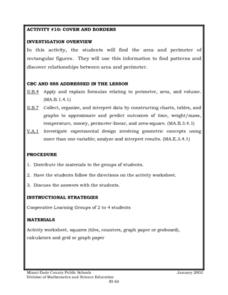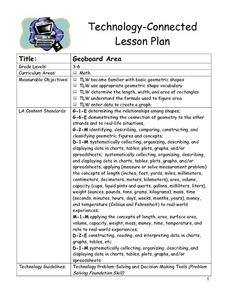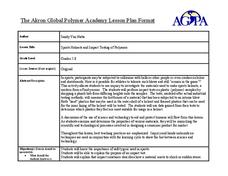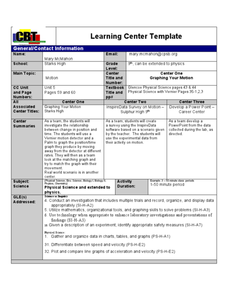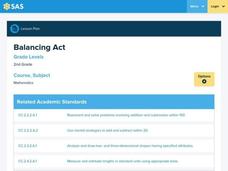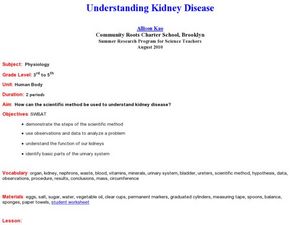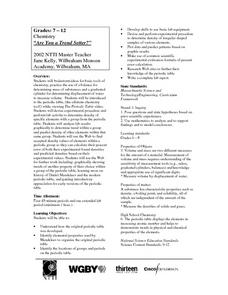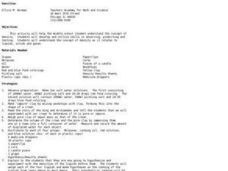Curated OER
Cover and Boarders
Pupils find the area and perimeter of rectangular figures. They use this information to find patterns and discover relationships between area and perimeter. Students apply and explain formulas relating to perimeter, area, and volume.
Curated OER
Newtonian Mechanics
Students familiarize themselves, through teacher demonstration, with Gavendish's apparatus first used for experimentally determining the value of the Universal Gravitational Constant G, and calculate theoretical value of Earth's...
Curated OER
Exploring Area and Perimeter
Two young scholars are blindfolded and each receives a cardboard square, one with pompoms glued around the edge and one with pompoms glued all over the surface. They identify what they feel. The class discusses perimeter and area of...
Curated OER
Making It Balance
Students listen to story, "The 100-Pound Problem," compare their weight with character in story, and weigh different classroom items using nonstandard units and standard units. They experiment with different items that can make scale...
Curated OER
Geoboard Area
Learners explore the basic geometric shapes and geometric shape vocabulary through the use of geoboards and virtual geoboards. They create a variety of shapes with a partner, build ten different rectangles on their geoboards, and...
Curated OER
Sports Helmets and Impact Testing of Polymers
Students examine the importance of good quality safety gear. In this investigative lesson plan, students will tests various polymers, collect data, and analyze the data to determine which polymer is best for safety helmets. They will...
Curated OER
Changes in the Copper Penny
Third graders explore the difference between a physical change in a substance and a chemical change. students study the volume, density, altering shape and chemistry of a copper penny.
Alabama Learning Exchange
Effects of Friction on a Moving Block
Students investigate how friction affects the movement of a block across surface areas. They test five different kinds of surfaces—smooth surface, wax paper, a paper towel, course, and fine sandpaper. They predict and record the results...
Curated OER
The Io Plasma Torus
In this plasma torus learning exercise, learners solve 5 problems including finding the dimensions of the Io torus, determining the formula for the volume of a torus, finding the actual volume of the Ion torus and finding the amount of...
Curated OER
I've Got That Sinking Feeling
Students design a simple boat and predict how much weight it can carry. They should also discover why objects float or sink and how this can be determined experimentally. A great lesson on buoyancy!
Curated OER
Antacid Tablet Race
Students compare the reaction rates of effervescent antacid tablets under different conditions. They investigate methods of increasing the power of rocket fuels by manipulating surface area and temperature.
Curated OER
How Long Until Dirt
Third graders examine the difference between composting and wasting food. They problem-solve what to do about leftovers after lunches so good food doesn't go to waste.They study food storage techniques that are environmentally friendly...
Curated OER
How Does Your Garden Grow?
Students construct and maintain a school garden. In this gardening instructional activity, students plan the construction of the garden by writing letters to local businesses asking for supplies and materials; students build the garden...
Curated OER
Oscillations
Students construct and compare the actions of various pendulums. In this pendulum motion lesson, students build and test different types of pendulums. They conduct experiments with the length of the swing arm and apply mathematical...
Curated OER
Utah Weather
Fourth graders diagram the weather in Utah through the use of a glyph. In this Utah weather lesson plan, 4th graders create weather glyphs of different areas in the state. Students answer questions about the weather and then compare...
Curated OER
"Graphing Your Motion"
Students study the concepts of motion, velocity, and acceleration through graphing their own movement using LoggerPro. They explain the difference between speed and velocity using the weather vane example. They discover the difference...
Curated OER
Why Should I Waste My Time Separating Garbage?
Students discuss the differences in the types of garbage. They use these differences to separate a sample of garbage. Partners then investigate the characteristics of landfills by searching on the Internet and by creating your own...
Curated OER
Balancing Act
Second graders identify the attributes of various shapes and estimate the weight of the objects. In this geometry lesson, 2nd graders identify the attributes of concrete objects and use a pan balance to weight them.
Curated OER
Understanding Kidney Disease
Students experiment to determine information about kidney function. In this kidney function lesson, students use the scientific method to experiment with eggs, water, salt, sugar, and vegetable oil to simulate kidney function. They...
Curated OER
Lord of the Rings - A Study of Tree Rings
Learners examine trees and discuss how the environment effected the tree. They also predict what the area look like in fifty years.
Curated OER
Osmosis and Diffusion: Egg Lab
Students examine why diffusion and osmosis happen in an egg cell. In this diffusion lesson plan students demonstrate a semi permeable membrane.
Curated OER
Are You a Trend Setter?
Students are introduced to the periodic table of elements. They devise and perform and experiment in which they determine the density of specific elements. They use their results to predict the density of other elements in the same group.
Curated OER
Basics of Science
In this basics of science instructional activity, students review the metric system, the difference between homogenous and heterogenous mixtures, the scientific method, and science lab first aid. This instructional activity has 15 short...
Curated OER
Densities
Students explore the concept of density. In this density lesson plan, students determine the density of a crown and a sample of clay. They hypothesize about the densities of 4 liquids they are given including molasses, cooking oil, a red...


